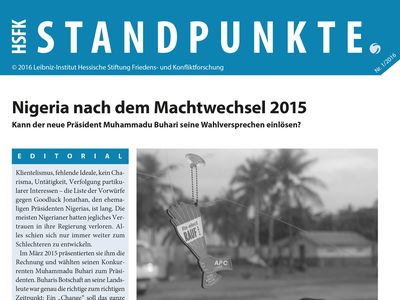Patronage, the pursuit of individual interest and idleness – the list of accusations against Nigeria’s former president, Goodluck Jonathan, is long. Most Nigerians have lost trust in their government.
In March 2015, they presented him the bill and elected his challenger, Muhammadu Buhari, with 54% of the given votes as the new president. Buhari’s message to his fellow countrymen was yet explicit: A “change” should rouse the entire country, radically reversing politics and society. They expected him to implement a change in norms that ought to solve the numerous economic, social and security-political problems in their country, more precisely to (re)establish the basis for a functioning state. But will Buhari be able to fulfill the Nigerians hopes for “change”? How serious is he about it? And is that, given the structural problems, even possible?
In the latest HSFK-Standpunkt, "Nigeria nach dem Machtwechsel 2015. Kann der neue Präsident Muhammadu Buhari seine Wahlversprechen einlösen?" Nina Müller assesses the hitherto measures and activities of the new president on the basis of the country’s structural problems: desolate security situation because of the advance of the Islamist terror group Boko Haram, corruption in almost every sector as well as misguided socio-economic developments. Examining what Buhari’s announced change in politics means in precise and what aftermaths can be traced, the Standpunkt shows that his election victory can be rated as a first step towards a change. In order to implement a new political culture in the long run, the author further recommends the support of international organizations and national institutions as well as the inclusion of local experts.
This HSFK-Standpunkt is available as a free PDF download (in German).
